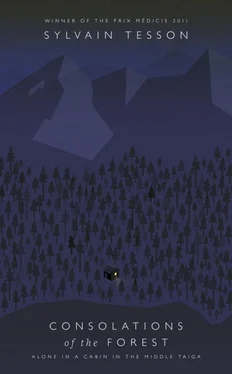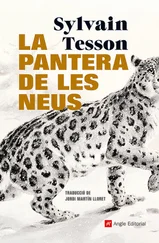‘Volodya?’
‘What?’
‘This isn’t the first time a Russian plane has wiped out some Poles.’
‘That’s not funny, fuck that, not funny at all.’
13 APRIL
Throughout the night the radio spat out its news. In my half-sleep, I heard the growing toll: ninety-five dead… ninety-six dead… ninety-seven dead… At around two o’clock I stopped up my ears with chewed paper. I tore out a page of Lord Jim , masticated it slowly (evil-tasting ink), and used Conrad’s literature as earplugs, thinking I would hear the sea.
This morning, Volodya takes me along to inspect his trap line. The job of a forest ranger is to keep poachers from massacring the animals. Volodya carries out his mission strictly, and strictly within the boundaries of the reserve. His cabin sits on the southern bank of the River Elohin, the northern boundary of the nature reserve. On the other side, the taiga is no longer protected, and that’s where Volodya sets his traps.
He’s wearing his skis: horsehide strips tacked onto a pair of wooden runners. I’m wearing snowshoes. It takes three hours to check the traps. We sink deeply into the powder, working our way along the joint between the mountain slope and the wooded shelf at its base. The jays signal our approach. Volodya’s young dog keeps raising false alarms, having not yet learned that one doesn’t disturb the master over a squirrel. Volodya is training him with gobs of yelling: ‘These dogs don’t know a thing, fucking hell!’ Out of fifteen traps, two minks. Volodya swears that the forest is empty and that life was better in the old days. What the Americans did with the prairie bison, the Russians did with their mustelids: they’ve exterminated the weasel family to put people in furs. One day, man enters the woods, and the gods withdraw.
I will have learned that one can live near a gigantic skating rink, feed on caviar, bear paws and moose liver, wear mink, stride through the woods with a rifle slung over one’s shoulder, witness each morning, when dawn touches the ice, one of the loveliest sights on the planet, and still dream of life in an apartment equipped with the latest robotics and high-tech gadgetry. The eremitic temptation follows an immutable cycle: one must first suffer from indigestion in the heart of the modern city in order to dream of a cosy cabin in a clearing. Bogged down in the grease of conformity and padded in the fat of comfort, one becomes attuned to the call of the forest.
At noon I head for home. A dusting of snow covers the ice; slippery going for my boots. I’m eager for a solitary evening. Mist veils the slopes. The shore changes shape again and again.
14 APRIL
The winter just won’t quit. Last night, 5°F. No sign of a thaw. Snowflakes fall from dawn to dusk, making a silky rustling. I spend the day in my mother cabin, my egg, my lair, crossing the threshold gratefully, feeling myself enveloped in that good warmth. The hours pass slowly through the window. I’m a bit bored. This day is a slightly leaky tap from which every hour slowly drips. As a companion, boredom is passé, but one adjusts anyway, although time does start tasting a little like cod-liver oil. Then suddenly, that taste is gone and with it, all boredom: time has become once more that light-footed and invisible procession, making its way through Being.
15 APRIL
It takes me two and a half hours to get out of the forest. I’m heading up the second valley to the south of my cabin, looking for a bivouac. Despite my snowshoes, I sink in halfway up my thighs. Every step is a major battle. I reach the upper edge of the forest at seven in the evening, soaked. I choose a shelf at an altitude of 4,000 feet, above a scree slope. About 300 feet below me, I can make out the tracks of a wolverine. Wolverines don’t hibernate, and this one has trekked across the flank of the mountain. The cold is brutal. Dwarf pines exposed by the wind crawl up among some rust-coloured boulders. Buryatia is a red streak to the east. I cut armfuls of branches to make myself a mattress, and start a fire in the gathering darkness. I pitch the tent, toss in my mattress and sleeping bag. I cook some pasta over the fire, then lounge on my bed of branches, softer than a Byzantine sofa. My fire sits between two boulders about five feet high, and their sides reflect the heat. It’s minus ten or twenty degrees Fahrenheit, but I’m warm in my band-shell of rocks heated by the flames. And I stare at the precise spot where sparks from the fire, shooting into the sky, grow pale and glitter with a last brilliance before melting into the stars. It’s hard to convince myself to go inside my tent; I’m like a kid who doesn’t want to turn off the TV. From my sleeping bag, I can hear the wood crackling. Nothing is as good as solitude. The only thing I need to make me perfectly happy is someone to whom I could explain this.
16 APRIL
I open the zip, blink in the raw sunshine, rejoice in the blue sky, sit up, and discover the image of the plain, gloriously empty at the bottom of its basin, 2,600 feet below. That’s how today begins. Last night a lynx visited my camp, leaving tracks around my tent.
The euphoria of camping mornings! There you are, above the forest; you have survived the night and received a little lagniappe of life.
I climb 1,300 feet higher, straight up from the campsite. At ten in the morning, I’m only 1,640 feet from the summit ridge. The lakeshore traces a sine wave: the capes for crests, the bays for hollows. The black scallops of the wooded salients bite into the icy plain, undulating like a battle diagram of enemy lines falling back and charging forward. I return to my fire, rekindle it, make tea, break camp and go home. The lynx checked out the wolverine’s tracks before heading into the forest. The snow is crisscrossed by the tracks of minks, hares and foxes. The forest thrums faintly with invisible life. Bushy lichens caress my face. I squint at the larches: they look like giants armed with bludgeons. If the desert hermits had retreated to the taigas, they would have invented religions peopled with joyous spirits and animal gods. The desert is desiccating, and I think about St Bernard congratulating himself, after a walk, for having noticed nothing of the outside world.
I’m back in my cabin in three hours. It’s 28°F and I have lunch outdoors, at the lakeshore table. The titmice waltz, intoxicated with warmth. The first full-blown all-out day of spring is an important date in a man’s year.
Shadows descend and, nibbling at the white plain, cross the lake to enshroud the Buryat mountains lounging on the opposite shore, convinced that sunset would pass them by.
17 APRIL
A hermit does not threaten human society, of which he is at most the living critique.
The vagabond steals and scrounges. The rebel-of-the-moment declaims on TV. The anarchist dreams of destroying the society in which he conceals himself. Today’s hacker plots the collapse of virtual citadels in his bedroom. The anarchist tinkers with his bombs in saloons, while the hacker arms his programs at his computer, but both need the society they deplore and target for destruction – which is their raison d’être .
The hermit stays off to one side in polite refusal, like a guest who, with a gentle gesture, declines the proffered dish. If society disappeared, the hermit would go on living as a hermit. Those in revolt against society, however, would find themselves technically out of work. The hermit does not oppose , but espouses a way of life. He seeks not to denounce a lie, but to find a truth. He is physically inoffensive and is tolerated as if he belonged to an intermediate order, a caste halfway between barbarians and civilized people. The chivalrous hero of the twelfth-century epic poem Yvain, the Knight with the Lion , driven mad by the loss of his lady-love, wanders naked in a forest until he is taken in and cared for by a hermit, who restores his reason and leads him back to civilization. The hermit: a passeur , a go-between of worlds.
Читать дальше












